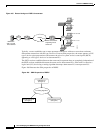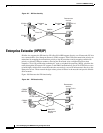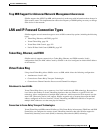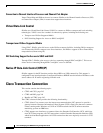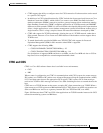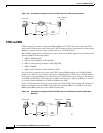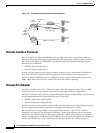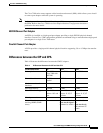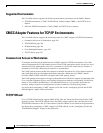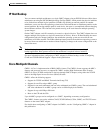
Overview of IBM Networking
Cisco Transaction Connection
BC-242
Cisco IOS Bridging and IBM Networking Configuration Guide
Connection to Channel Interface Processor and Channel Port Adapter
Virtual Token Ring and SRB can be used to connect SNASw to the Channel Interface Processor (CIP)
or Channel Port Adapter (CPA) in routers that support those interfaces.
Virtual Data-Link Control
SNASw uses Virtual Data-Link Control (VDLC) to connect to DLSw+ transport and local switching
technologies. VDLC is used for a number of connectivity options, including the following two:
• Transport over DLSw+ Supported Media
• DLC Switching Support for Access to SDLC and QLLC
Transport over DLSw+ Supported Media
Using VDLC, SNASw gains full access to the DLSw+ transport facilities, including DLSw+ transport
over IP networks, DLSw+ transport over direct interfaces, and DLSw+ support of direct Frame Relay
encapsulation (without using IP).
DLC Switching Support for Access to SDLC and QLLC
Through VDLC, SNASw gains access to devices connecting through SDLC and QLLC. This access
allows devices connecting through SDLC and QLLC access to SNASw.
Native IP Data-Link Control (HPR/IP)
SNASw support for the EE function provides direct HPR over UDP connectivity. This support is
configured for any interface that has a configured IP address. HPR/IP uses the interface IP address as the
source address for IP traffic originating from this node.
Cisco Transaction Connection
This section contains the following topics:
• CTRC and CICS, page 243
• CTRC and DB2, page 244
• Benefits of CTRC, page 245
The CTRC software feature provides the following functionality:
• CTRC allows Cisco routers to use the intersystem communication (ISC) protocol to provide a
gateway between Customer Information Control System (CICS) clients (also known as common
clients) running under Windows or UNIX on TCP/IP networks and CICS online transaction
monitoring systems on IBM hosts.
• CTRC supports two interfaces to common clients: the Extended Call Interface (ECI), which lets
non-CICS client programs call CICS transactions, and the Extended Presentation Interface (EPI),
which lets distributed applications call CICS transactions that were originally accessed via 3270
terminals.



